The motley collection of images below was obtained from the Prints & Engravings section of the Digital Archives of Loire-Atlantique. That's not to say that all the items seen here are specifically from or about this particular département. Rather, that's just where they've ended up, although the vast majority that I saw are either from Pays-de-la-Loire or adjoining regions.
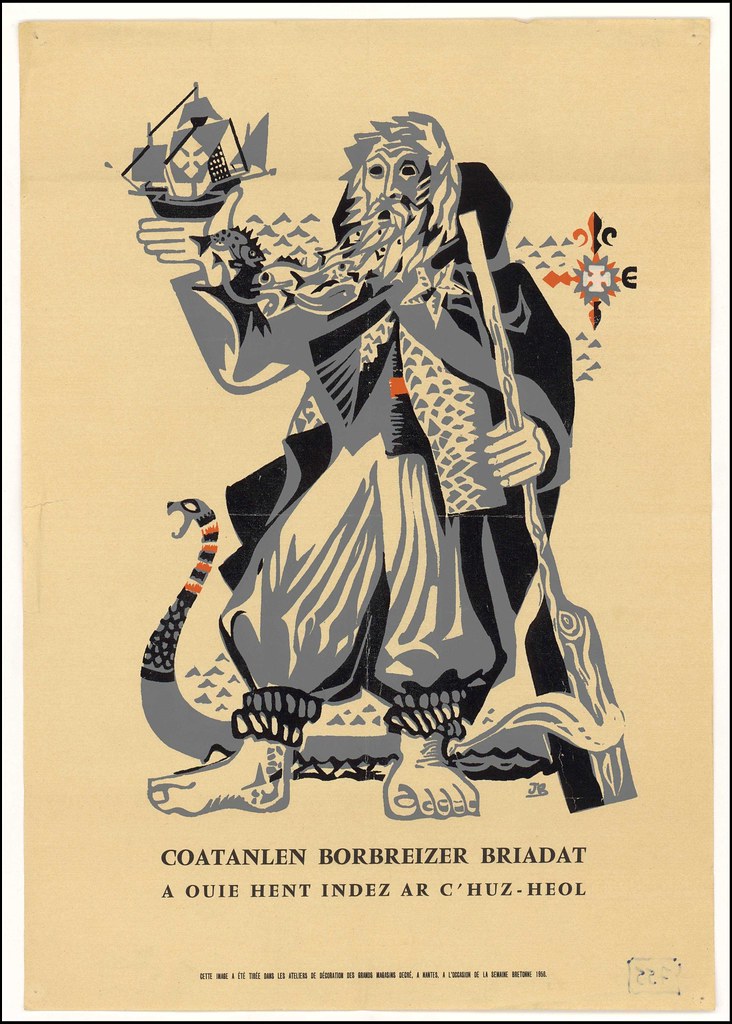
The story goes that a man named Coatanlen from Île-de-Bréhat, an island off the coast of Brittany, was in Lisbon in 1484 and met Christopher Columbus. Coatanlen told the explorer of the existence of the New World and how he and his fellow Bréhat fishermen sailed across the Atlantic to Newfoundland in search of their catch. So the Bréhatians would have it believed that they discovered America before Columbus. Or something along those lines.
The print above - with text in the Breton language - celebrates the Coatanlen legend and is a reproduction of a poster seen in Nantes shops during 1958 Brittany week. (Thanks JK)
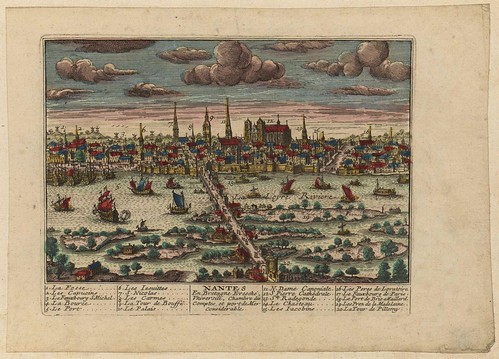
Hand-coloured, engraved map of the city of Nantes (~late 17th c. or so)
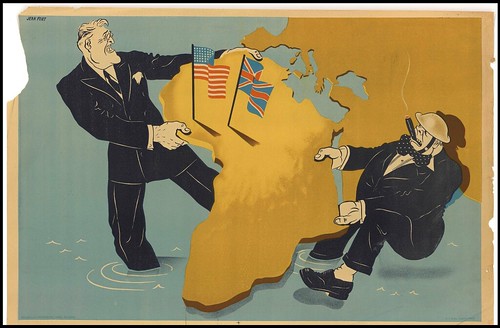
WWII caricature of Churchill and Roosevelt fighting over Africa by artist Jean Fort and published in 1941 by Bedos & Co of Paris at the behest of ORAFF*, the German propaganda unit in occupied France.
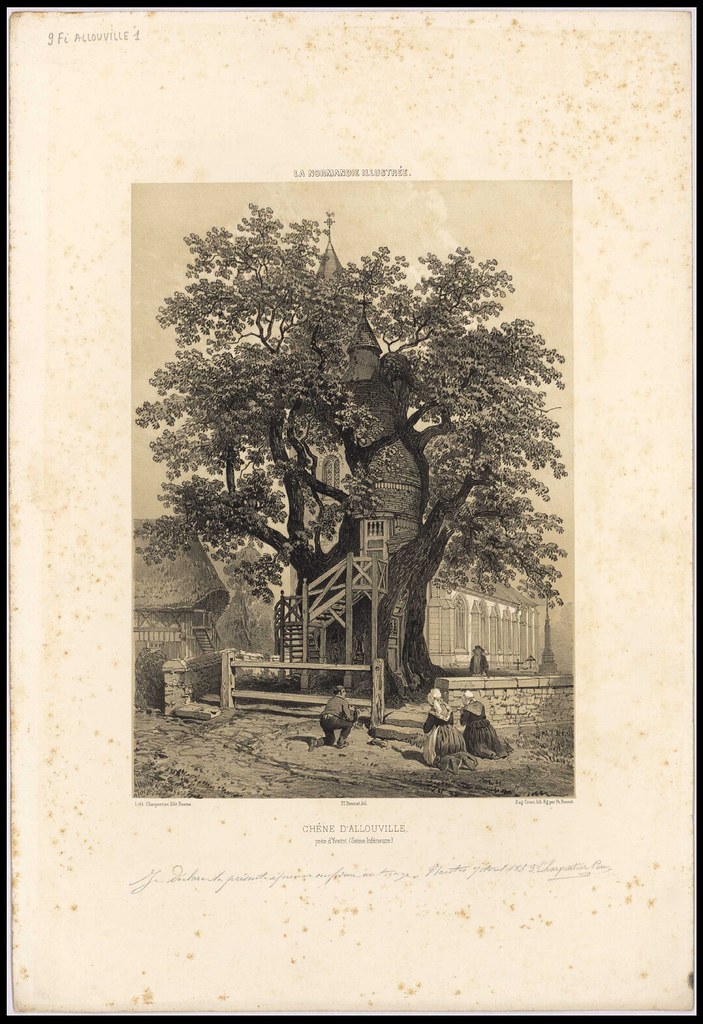
The Chêne Chapelle or Chapel Oak of Allouville-Bellefosse in the northern French region of Haute-Normandie is the most famous tree in France. Since 1669 the ~1000 year old tree has housed two tiny religious chapels (Notre Dame de la Paix [Our Lady of Peace] and Chambre de l'Ermite [the Hermit's room] in its hollow trunk, together with an outside spiral access staircase.
See: Wikimedia | Flickr & the blog Krapo Arboricole - en Français - whose purview includes the venerable trees of France.
This lithographed plate of Chêne Chapelle appeared in 'La Normandie Illustrée' by Felix Benoist, published in Nantes in the mid-1850s by Charpentier Père [more plates].
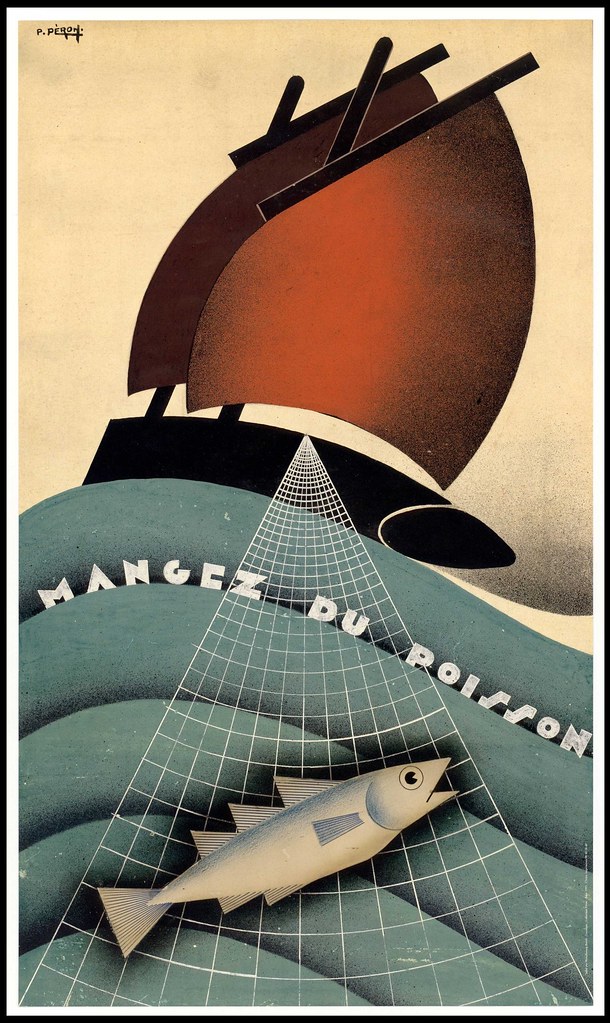
Eat some fish!
This 1995 poster was drawn by P Péron and published by Imprimerie Cloître in Brest. Presumably it was a primary industry business drive.
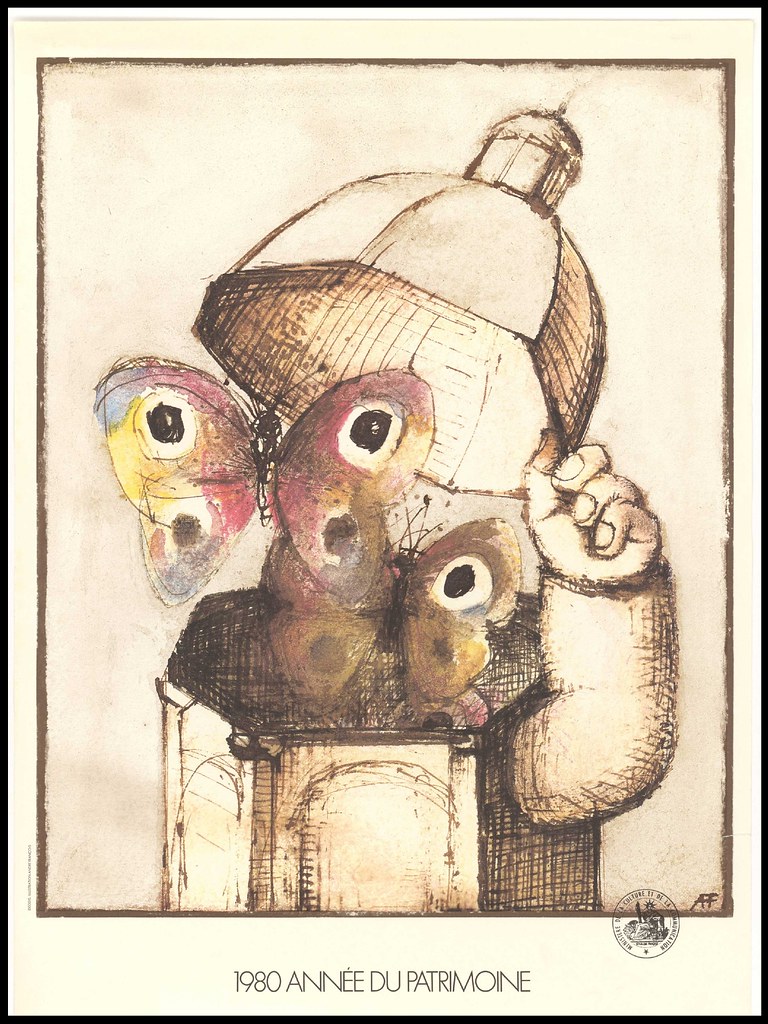
A stylised 1980 heritage poster for an astronomical observatory.
[I'm fairly sure that I've posted this image here a loooong time ago]
[I'm fairly sure that I've posted this image here a loooong time ago]
![Homme de Châteauneuf-du-Faou (Finistère). géographie [Autres lieux hors département] Châteauneuf-du-Faou Finistère](http://farm6.static.flickr.com/5136/5408268329_0d5efc4737_b.jpg)
Designed and engraved by François-Hippolyte Lalaisse and first published in Nantes in 1848 by Charpentier Père, this man from Châteauneuf-du-Faou (a commune in the département of Finistère) is from a work on Brittany costumes and scenic engravings: 'Galerie Armoricaine'.
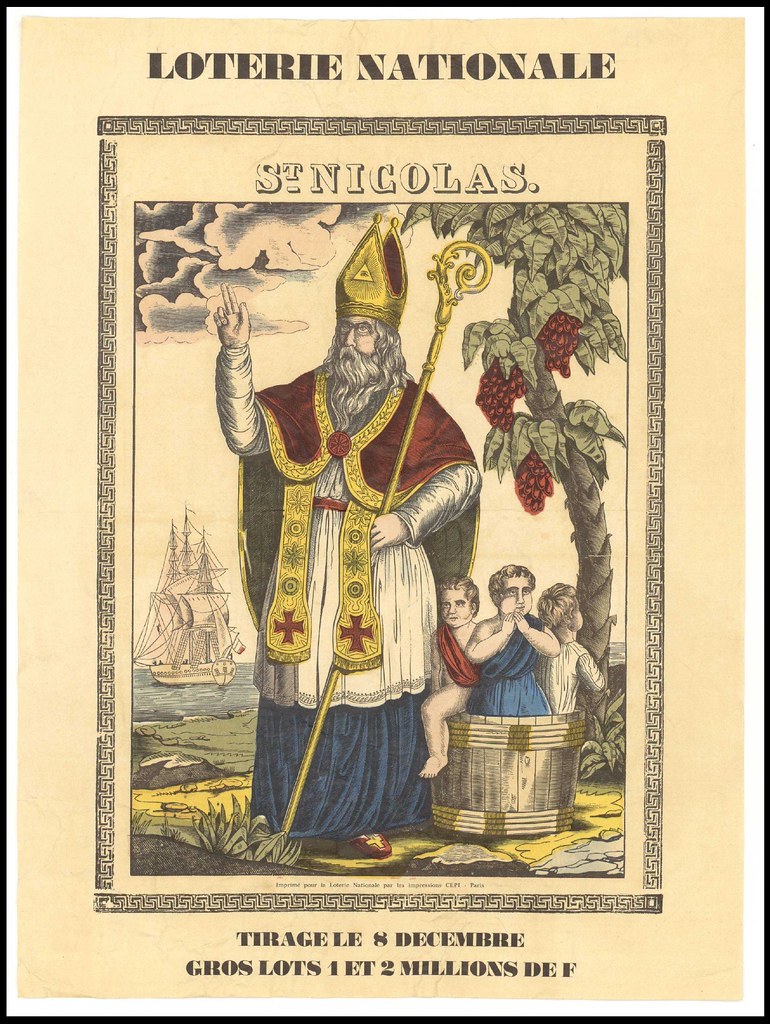
Not even St Nicholas can resist the lure of advertising for the national lottery
(undated, printed in Paris)
(undated, printed in Paris)
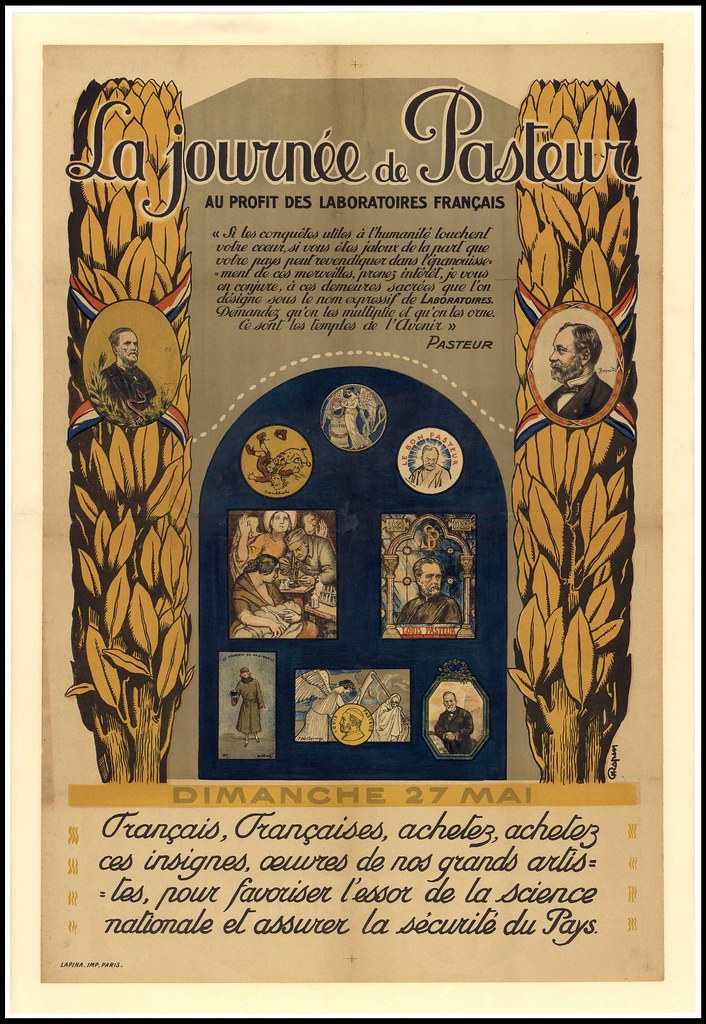
Public health poster from 1922 for the Pasteur Institute,
trying to raise money for vaccine research on Pasteur Day.
trying to raise money for vaccine research on Pasteur Day.
![Grand hôtel du Lion d’Or à Redon, Ille-et-Vilaine. géographie [Autres lieux hors département] Ille-et-Vilaine Lion d’Or (hôtel du) Redon](http://farm6.static.flickr.com/5173/5408141445_614a2ebdfa_b.jpg)
Another mid-1850s print from Charpentier Père in Nantes; this time an advertisement for the Golden Lion Hotel in the Britanny town of Redon in the Ille-et-Vilaine département . If the building survives today, it has likely changed names if not business type.
![[Normandes dans une barque. Page de titre de La Normandie illustrée.] scènes [Autres lieux hors département] Normandie](http://farm6.static.flickr.com/5218/5407723846_d88ce7bdfb_b.jpg)
From a different edition of 'La Normandie Illustrée'
(a few images up), this lithograph shows a group of ladies
from Normandy wearing local garb in a row-boat.
(a few images up), this lithograph shows a group of ladies
from Normandy wearing local garb in a row-boat.
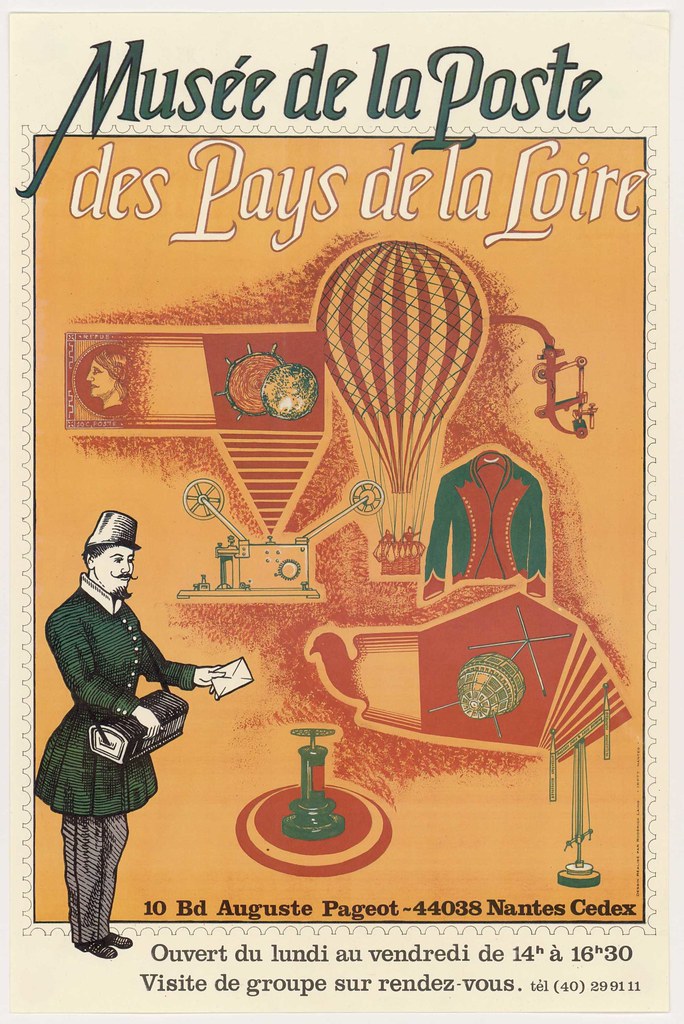
A Postal Museum flyer designed by Roderick Laing from Nantes.
It's undated but there are a couple of search
results from the 1970s referencing Laing.
It's undated but there are a couple of search
results from the 1970s referencing Laing.
![Table des symboles urbains du département de Loire-Atlantique. manifestation culturelle ouvrage d’art [Autres lieux hors département] Loire Atlantique](http://farm6.static.flickr.com/5215/5409211450_a921a1b4fd_b.jpg)
Table of municipal armorial crests for the communes of Loire-Atlantique. The representative symbols date back to the Crusades. I think the motifs chosen are intended as examples of the development of the crests over the centuries. There are less than 100 coats of arms depicted but there are over 200 communes in Loire-Atlantique today (this may have something to do with Loire-Atlantique originally being incorporated as part of Brittany... or it may not).
[click through for enlarged versions; those images with black borders were spliced together
from screencaps; some images have been background cleaned to varying extents]
from screencaps; some images have been background cleaned to varying extents]
- The main digital collection of Loire-Atlantique.
- The posters and engravings section -- you can search by location, keyword thesaurus (try 'géographie' for example) or designer/artist name, but there's no way (that I could see) to simply browse. There's also a distinct lack of background detail.
I once read that cocaine was found in the bodies of Ancient Egyptian mummies when pathologists were performing routine toxicology tests. Now the coca plant is native to South America.. so it could be that the Egyptians had explored much further than currently assumed and were possibly the primary founders of the Americas. Or, I am also thinking that perhaps the coca plants once grew in Africa but were later replaced by predatory plant species.
ReplyDeleteVery interesting find though!
I absolutely love your posts and the Chêne Chapelle is definitely one of the places I want to visit, it looks gorgeous.
ReplyDeleteDo you know if there is any way to buy prints of these?
ReplyDeleteMargo, I think that's something you'd need to ask the Loire-Atlantique digital archives staff about.
ReplyDeleteThe "1980 Année du Patrimoine" poster is by André François
ReplyDeleteFrom Wikipedia, the free encyclopedia
André François
Born André Farkas
9 November 1915
Temesvár, Austria-Hungary (now Timişoara, Romania)
Died 11 April 2005 (aged 89)
Grisy-les-Plâtres, Val-d'Oise
Nationality French
Area(s) Cartoonist
André François (9 November 1915 – 11 April 2005), born André Farkas, was a Hungarian-born French cartoonist.
He was born to a Hungarian Jewish family in Temesvár, Austria-Hungary (now Timişoara, Romania), He studied at the Academy of Fine Arts in Budapest (1932–33). He moved to Paris in 1934 and entered to the atelier of the famous poster artist Adolphe Cassandre (1935–36). He became a French citizen in 1939.
He worked as a painter, sculptor and graphic designer, but is best remembered for his cartoons, whose subtle humor and wide influence bear comparison to those of Saul Steinberg. François initially worked for French leftist newspapers (Le Nouvel Observateur) and illustrated books by authors such as Jacques Prévert, but gradually reached a larger audience, publishing in leading magazines of the United Kingdom (Punch) and the United States (The New Yorker). He became a close friend and collaborator of Ronald Searle. He was member of Alliance Graphique International.
He died in his home in Grisy-les-Plâtres, in the Val-d'Oise département.
Thanks!!
ReplyDelete